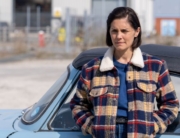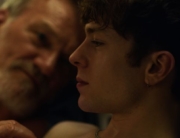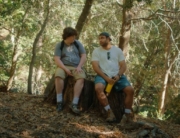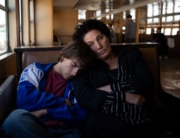Edited, Written & Directed by Andrew Haigh
Produced by Tristan Goligher
Released by Sundance Selects
UK. 86 min. Not rated
With Tom Cullen & Chris New
Two young good-looking guys in their twenties hook up, exchange numbers the morning after, meet that same afternoon and then again that night before one of them has to head off thousands of miles away for the next two years. Simple enough, but deceptively so. This premise might sound like the gay Before Sunrise or its more somber sequel, Before Sunset. It’s equally as chatty as those Richard Linklater films, but the dialogue is more to the point, less cerebral, and below the belt. Director Andrew Haigh doesn’t let you forget this is a boy-tops-boy romance. Sure, you’ve seen the physical gymnastics before, but probably not with as much steely honesty—emotional vulnerability is the toughest nut to crack.
The script’s morning-after set-up shoves the men into a dialogue where they have to talk about their feelings when Glen whips out his tape recorder to tape Russell’s recollections of how and why he took him home. It’s all for Glen’s art project of his collection of post-mortems by his previous tricks. Russell readily reveals all, even when Glen aggressively turns it into an interrogation. Apparently Russell wasn’t so drunk when they met at a bar that he can’t remember that he was Glen’s second choice, but the confrontational interviewer doesn’t let the soft-spoken and scruffy Russell off the hook, calling his bluff by doubting his sincerity. He points out that everyone projects whom they’d like to be when meeting a potential partner.
Though the banter and barbs provide the audience a quick on the read on the men’s backgrounds, thankfully not every motivation is so carefully declared or figured out. Like a wink and a nod to its core audience, there’s an acknowledgment of the plot’s artifice when Glen recognizes that he’s not sure if anyone would want to hear the tape-recorded ramblings of strangers in some gallery. He’s talking about his project, but he may as well as be talking about the film. He’s sure that the gays will come, only in the hopes of seeing nudity, which Weekend moderately obliges. The sex never steals the focus. And in the climactic moment, Glen asks, “Is this our Notting Hill moment?” If so, Russell is in the Julia Roberts role. (What might raise eyebrows is the amount of coke consumed: talk, snort another line, talk, repeat.)
Thanks to the adroit cast, the clear-eyed British film stakes another claim for gay visibility, years after the rise of Queer Cinema and a glut of equally low-budget but poorly scripted and acted gay-themed films. Every generation or so needs a rallying cry. Weekend follows in the footsteps of such varied films as 1986’s Parting Glances or 1997’s Leather Jacket Love Story, yet it feels fresh. What really sets the film apart is its location, Nottingham in the Midlands, far from the blasé and the seemingly more tolerant London. For Americans accustomed to films shot along the Thames or in the most fetid public housing, the setting is exotic. The cityscape of terrace row housing mixed in with high-rise council estates has a clean, sharp look. Just how important is the setting? When the men kiss and embrace on a train platform, there are off-screen hoots and jeers. They ignore the hostility, and whether because of actor Tom Cullen’s remarkably quicksilver reaction, the moment jolts, a reminder that there is more to this (tentative) love story.
















Leave A Comment